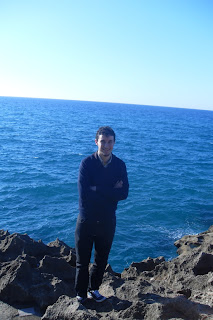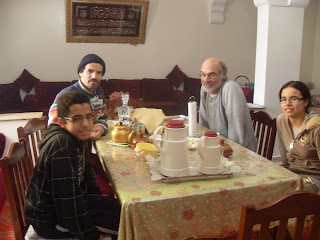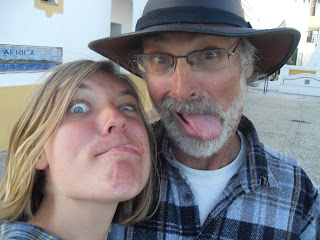Three day's walking brought us to the scenic mountain town of Chefchaouen. On the way we camped by the roadside twice; the first night in a pine forest, the second by a dry river bed. As we ascended into the Rif Mountains, pine forests gave way to scattered olive groves. Men were plowing everywhere with mules and wooden plows while the women tended flocks of sheep or cattle.
At one point a man stopped his car to ask if we needed a ride. This has been a common occurrence since we began walking in Morocco. As always we declined the invitation, telling him we were peace pilgrims. He immediately responded by asking if we needed anything; before I could answer he asked if we needed money; again, before I could answer he handed us enough money to get us down the road for another week or two. I am again deeply humbled by the generosity of these people. There is a lot for the Western world to learn from Islam.
Without anybody to host us in Chefchaouen, we decided to take a break for a few days at a campsite above the town. Two day's rest, a good meal or two, and a couple of hot showers will get us ready for the long trek down to Fes.
At our campsite I was challenged by a Frenchman concerning the pilgrimage. He wanted to know not so much what it is about or why, but, as he put it, "Who are you to be telling people in the Middle East about peace?"
I had a difficult time explaining anything to him; there was a language barrier; but my response is as follows: I am nobody; however, I am a Friend of Christ, and as a Friend of Christ I am also a Friend of Humanity, and as a Friend of Humanity I will talk to anyone on Earth about peace if they are willing to listen.
A good end cannot sanctify evil means; nor must we ever do evil, that good may come of it... We are too ready to retaliate, rather than forgive... And yet we could hurt no man that we believe loves us. Let us try then what love will do: for if men did once see we love them, we should soon find they would not harm us. Force may subdue, but Love gains: and he that forgives first, wins the laurel.
William Penn
Be patterns, be examples in all countries, places, islands, nations wherever you come; that your carriage and life may preach among all sorts of people, and to them; then you will come to walk cheerfully over the world, answering that of God in everyone...
George Fox
William Penn
Be patterns, be examples in all countries, places, islands, nations wherever you come; that your carriage and life may preach among all sorts of people, and to them; then you will come to walk cheerfully over the world, answering that of God in everyone...
George Fox
Thursday, December 29, 2011
Wednesday, December 28, 2011
Overnight in Tetouan
We arrived in Tetouan on the 10th day of a sanitary worker's strike, and our original host fell through, but a phone call to Couchsurfing host Kamil saved us from a difficult situation by putting a roof over our heads and good food into our bellies. We hadn't counted on Kamil because he was supposed to be out of town on the 25th; in fact he was just on his way back from Tanger on a bus when we reached him. Despite this last minute request, and despite a mix up that had us waiting for him in one place and him waiting for us in another, Kamil was happy to give us refuge. In our brief time together we talked about the prospect of peace in the Middle East; we disagreed on a few points, but agreed on others. We were all up early the next morning for work, Kamil's as an air traffic controller and ours as peace walkers, but before we departed Kamil stocked us with a few day's supplies and some cash for our journey to Chefchaouen and beyond. Thank you, friend.
Sunday, December 25, 2011
On the Way to Tetouan
The highway we've walked the past three days from Tangier to Tetouan is a busy one, but it's far more pedestrian- compatible than any highway in Spain, as everybody here seems to walk at one time or another. Taxis, vans, and trucks are ready to stop at any time to pick someone up. However, Olivia and I did the kilometers on foot, camping the first night in a field after asking the owner's permission. Some local boys helped us pitch our tent, and although very poor, the owner of the field showed up with flat bread and potato stew for us to eat.
Yesterday's walk took us up into the beginning of the Rif Mountains, which are nothing one would expect to see. The womens' straw hats and colorful clothing, and the dark green mountains seem more like something one would see in Guatemala than Morocco. We camped Christmas Eve in a relatively secluded spot in the mountains, then continued our walk this morning, descending towards Tetouan. Before arriving here we were invited to tea by an old fellow named Ahmed and his friend Abdullah. Ahmed gave us some words of wisdom before we departed to finish the day's trek.
We've just arrived in Tetouan; once again we have a Couchsurfing host waiting for us, l'hamdullah!
Yesterday's walk took us up into the beginning of the Rif Mountains, which are nothing one would expect to see. The womens' straw hats and colorful clothing, and the dark green mountains seem more like something one would see in Guatemala than Morocco. We camped Christmas Eve in a relatively secluded spot in the mountains, then continued our walk this morning, descending towards Tetouan. Before arriving here we were invited to tea by an old fellow named Ahmed and his friend Abdullah. Ahmed gave us some words of wisdom before we departed to finish the day's trek.
We've just arrived in Tetouan; once again we have a Couchsurfing host waiting for us, l'hamdullah!
Thursday, December 22, 2011
Learning the Meaning of Hospitality in Tangier
My daughter and I have spent the past week in Tangier in the home of an incredibly generous family. This family of devoted Muslims took us in at the urging of their son, Mohammed, whom we never met in person. Before reaching Seville, we had asked Mohammed (who attends university there) for a place to stay through couchsurfing. He hadn't been able to host us in Seville, but said his family would take us in in Tangier. We nevertheless looked for other hosts in Tangier, as the couchsurfing rule in Spain had been that if you asked for ten places to stay, you might get one. As it turned out, not only did Mohammed's family take us in and insist that we stay, but nearly everyone we asked in Tangier accepted us as guests. We ultimately had to turn them all down but one, who we agreed to meet for tea.
The meeting for tea turned out to be an all expenses paid trip to the Grottoes of Hercules, an impressive seaside cavern near Tangier, and later in the evening tea at one of Tangier's more prestigious cafés. Zakaria, as our day host is called, would have also treated us to lunch at the Grottoes of Hercules if we hadn't already been committed to lunch at our host family's home. Zakaria is already arranging for us to stay with his parents in Fes, and having learned our lesson we won't ask for any other hosts.
Both Zakaria and Said, who is the head of the family hosting us, are devoted Muslims, though you wouldn't know it by their appearances. Neither of them wear djalabas, and young Zakaria could pass for a student at any American university. And as devoted Muslims, both insist on true Islam as a religion of peace. Both of them support and understand this pilgrimage, not only as a pilgrimage for peace but as a calling; both of them unhesitatingly support a peaceful resolution for Palestine and Israel; and both believe in peace and understanding between all cultures and faiths.
How is it that so many so-called Christians in my country clamor for war against Islam when these very devoted Muslims (neither Zakaria nor Said are 'lukewarm' about their faith) desire only peace?
Tomorrow Olivia and I will continue our walk for peace, going south towards Tetouan and Chefchaouen, but only with great hesitation. We will miss our hospitable and loving hosts, true Muslims who are examples for all who claim to love God.
Said, Badia, Houda, Ayoub: shukran and bslama; we hope to see you again.
Zakaria and Majda, the same.
Peace to you.
The meeting for tea turned out to be an all expenses paid trip to the Grottoes of Hercules, an impressive seaside cavern near Tangier, and later in the evening tea at one of Tangier's more prestigious cafés. Zakaria, as our day host is called, would have also treated us to lunch at the Grottoes of Hercules if we hadn't already been committed to lunch at our host family's home. Zakaria is already arranging for us to stay with his parents in Fes, and having learned our lesson we won't ask for any other hosts.
Both Zakaria and Said, who is the head of the family hosting us, are devoted Muslims, though you wouldn't know it by their appearances. Neither of them wear djalabas, and young Zakaria could pass for a student at any American university. And as devoted Muslims, both insist on true Islam as a religion of peace. Both of them support and understand this pilgrimage, not only as a pilgrimage for peace but as a calling; both of them unhesitatingly support a peaceful resolution for Palestine and Israel; and both believe in peace and understanding between all cultures and faiths.
How is it that so many so-called Christians in my country clamor for war against Islam when these very devoted Muslims (neither Zakaria nor Said are 'lukewarm' about their faith) desire only peace?
Tomorrow Olivia and I will continue our walk for peace, going south towards Tetouan and Chefchaouen, but only with great hesitation. We will miss our hospitable and loving hosts, true Muslims who are examples for all who claim to love God.
Said, Badia, Houda, Ayoub: shukran and bslama; we hope to see you again.
Zakaria and Majda, the same.
Peace to you.
Tuesday, December 20, 2011
Tarifa to Morocco
 |
| Jorge, our host in Tarifa |
 |
| Tagine |
 |
| Olivia by the Grottoes of Hercules |
 |
| The Grottoes of Hercules, near Tangier |
 |
| Zakaria, who brought us to the cave |
 |
| The camel that tried to bite Zakaria |
 |
| Zakaria treating us to tea in Tangier |
 |
| Zakaria's sister, who gave Olivia a traditional dress. |
 |
| Leaving Europe for Africa |
 |
| Tangier |
 |
| The family that adopted us in Tangier. Said in the background, his son Ayoub, and his daughter, Houda. |
 |
| Getting cross-cultural |
 |
| The medina |
 |
| The Grand Mosque |
 |
| The Tangier Medina |
 |
| Ayoub and I |
Down the Coast
In El Puerto de Santa Maria our friend and host, Manuel, gave us detailed information on how to get to Tarifa via trekking routes rather than highways once we'd gotten past Chiclana de la Frontera. After a quick visit to Cadiz and an overnight stop in El Puerto (where Cadiz University Sea Sciences major Emilio took us in) we took backroads towards Chiclana, camping for the night a few kilometers short of that town.
The next day, while heading towards Conil de la Frontera, we met Pete, an Englishman with a big backpack on a small motorbike who sputters down the shoulder of the highway to get where he is going. He warned us about the rain in Spain, and talked to us about his conversion from skinhead hooliganism to Hinduism. He signed our petitions for peace in the Middle East and blessed us before we continued our walk. Some thirty minutes later, Pete sputtered by, stopped his motorbike and handed us twenty euros for our journey. We graciously accepted. Thank you, Pete.
Arriving at Conil we slept on the beach, then took advantage the following days of Manuel's maps he'd made for us. The going was sometimes slow and difficult in soft sand, but it was well worth it as we rounded Cape Trafalgar and climbed over the cliffs between Los Canos de Meca and Barbate. It was on these heights that we had our first spectacular view of Morocco. We camped the night just short of Barbate.
The next day, in desperate need of a shower, we paid the price to use a gym in Barbate, but only for the shower, then we continued our journey past Zahara, which is a ghost town in winter but for a few diehard surfers. We passed Atlanterra to find ourselves in an eerily deserted, but extremely wealthy neighborhood on cliffs overlooking the sea. We felt that we were trespassing as our pilgrim backpacking was wholly incongruous with our surroundings.
Rounding the point near Atlanterra we made our way down to Playa Bolonia, and as it was getting dark we had to camp on the beach, surrounded by 'no camping' signs. The next day we hiked the final 22 kilometers to Tarifa, the southernmost point of Europe and undoubtedly the warmest at this time of year. We hiked the last 5 or 6 kilometers on the beach, watching the kite surfers, then found our first host in several days, Jorge, who kept us well cared for for the next two days before our crossing to Morocco and Africa.
The next day, while heading towards Conil de la Frontera, we met Pete, an Englishman with a big backpack on a small motorbike who sputters down the shoulder of the highway to get where he is going. He warned us about the rain in Spain, and talked to us about his conversion from skinhead hooliganism to Hinduism. He signed our petitions for peace in the Middle East and blessed us before we continued our walk. Some thirty minutes later, Pete sputtered by, stopped his motorbike and handed us twenty euros for our journey. We graciously accepted. Thank you, Pete.
Arriving at Conil we slept on the beach, then took advantage the following days of Manuel's maps he'd made for us. The going was sometimes slow and difficult in soft sand, but it was well worth it as we rounded Cape Trafalgar and climbed over the cliffs between Los Canos de Meca and Barbate. It was on these heights that we had our first spectacular view of Morocco. We camped the night just short of Barbate.
The next day, in desperate need of a shower, we paid the price to use a gym in Barbate, but only for the shower, then we continued our journey past Zahara, which is a ghost town in winter but for a few diehard surfers. We passed Atlanterra to find ourselves in an eerily deserted, but extremely wealthy neighborhood on cliffs overlooking the sea. We felt that we were trespassing as our pilgrim backpacking was wholly incongruous with our surroundings.
Rounding the point near Atlanterra we made our way down to Playa Bolonia, and as it was getting dark we had to camp on the beach, surrounded by 'no camping' signs. The next day we hiked the final 22 kilometers to Tarifa, the southernmost point of Europe and undoubtedly the warmest at this time of year. We hiked the last 5 or 6 kilometers on the beach, watching the kite surfers, then found our first host in several days, Jorge, who kept us well cared for for the next two days before our crossing to Morocco and Africa.
Monday, December 19, 2011
From Conil de la frontera to Tarifa
De Sanlucar de Barrameda a Conil de la frontera
Friday, December 9, 2011
From Zafra to El Puerto de Santa Maria
 |
| Two of our four hosts in Zafra; Amanda from Scotland, Jess from the USA, and a friend |
 |
| We saw a lot of these between Zafra and Seville |
 |
| The Via de la Plata after the rain |
 |
| Fording one of the streams across the Via de la Plata |
 |
| This photo defines this entire pilgrimage |
 |
| Goin south on the Via de la Plata |
 |
| Countryside castle |
 |
 |
| Waiting at the door of an albergue |
 |
| Seville |
 |
| Angel, our Bulgarian host in Seville |
 |
| The Guadalquivir |
 |
| Always the rain |
 |
| Our hosts in Utrera: Chris, from New Mexico, who had a long night, and Eszter, from Hungary, who didn't. |
Subscribe to:
Comments (Atom)






























